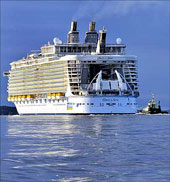 State-owned Shipping Corporation of India (SCI) on Monday said it will acquire 60 vessels by March, 2015, entailing an investment of about Rs 20,000 crore (Rs 200 billion).
State-owned Shipping Corporation of India (SCI) on Monday said it will acquire 60 vessels by March, 2015, entailing an investment of about Rs 20,000 crore (Rs 200 billion).
The company also plans to diversify and enter into areas like ship-building to become a full-fledged maritime player from a shipping company at present.
"We have 30 odd vessels on order for $2 billion (Rs 9,150 crore). We will order more for over $2 billion (over Rs 9,150 crore). The vessels will be delivered by 2014-15," SCI chairman and managing director S Hajara said on the sidelines of a SCOPE conference.
SCI at present owns 76 ships of 5.1 million Deadweight Tonnage (DWT) and mans 60 vessels of 0.2 million tonnes DWT. It plans to take its capacity to 12 million DWT by March, 2015, by acquiring these 60 vessels. DWT is the total weight of the ship, including the cargo, crew and fuel.
Hajara had said last month that there was a likelihood of these ships being built in South Korea and China. The company had planned to acquire 62 ships during the XI Five-Year Plan. On the company's diversification plans, Hajara said SCI plans to become a global maritime player instead of a mere shipping company and will enter the ship-building segment.
"We are looking at shipbuilding also. It is a backward integration for a shipping company. We will be doing it in partnership either with an Indian or foreign company," he said. He, however, did not give any timeframe for this.
SCI recently concluded a joint venture with the country's largest steel maker, SAIL, for the import of coking coal and is holding discussions to form a JV with Shipping Corporation of South Africa for transportation of minerals.
It is also in talks with ONGC for supporting the oil and gas firm's offshore activities.
"We are in discussion with National Shipping Corporation of South Africa. We will be looking at primarily targeting the South African market. South Africa is very rich for minerals and raw material. This shipping company is supposed to be getting some preference for movement of South African minerals," Hajara said.










 © 2025
© 2025